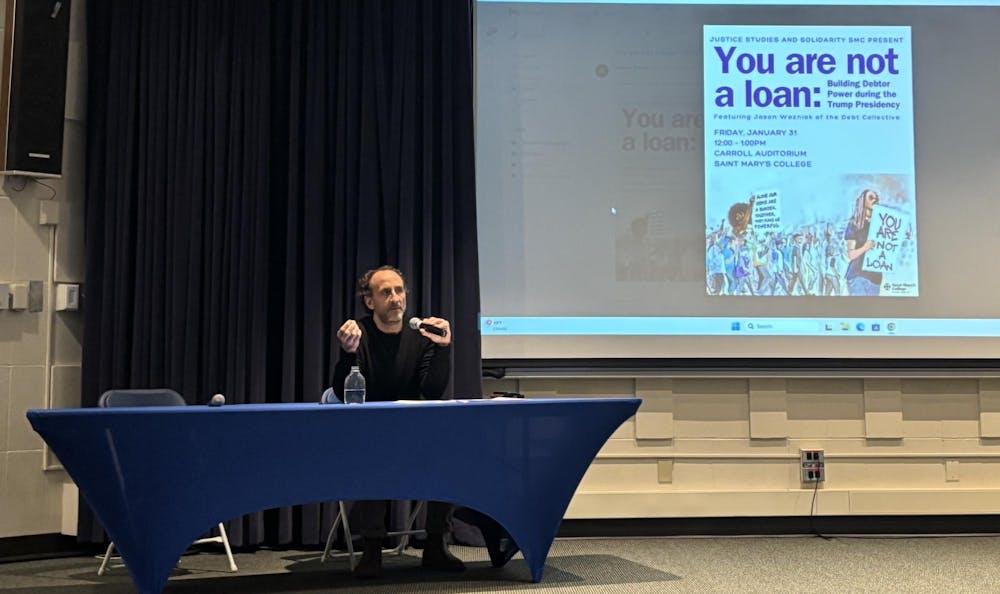Jason Wozniak, higher education researcher and organizer for the Debt Collective, began his presentation to his audience with the question, “What does it look like to build bonds of solidarity that give us power?”
The justice studies department and newly founded Solidarity SMC co-sponsored Wozniak to speak in Carroll Auditorium Friday afternoon, titling the event “You Are Not a Loan: Building Debtor Power during the Trump Presidency.”
The Debt Collective, a self-proclaimed union of debtors, is a grassroots organization founded with the purpose of abolishing debt throughout the country. Though Wozniak admitted coming from a “very leftist perspective,” he said he wanted to encourage bipartisan dialogue.
“I think it's really important to think about ways in which debt becomes a vehicle or a vector by which we can bring together different groups and build solidarity,” Wozniak said.
Associate professor of philosophy and director of the justice studies department Andrew Pierce met Wozniak at a conference in Chicago. After reading “Can't Pay, Won't Pay: The Case for Economic Disobedience and Debt Abolition,” a book by the Debt Collective’s co-founder Astra Taylor, Pierce decided he wanted the organization to speak at the college to introduce their perspective to students.
“I always try to bring in speakers who are addressing social injustices that reflect students' concerns and experiences,” Pierce said. “The extensive debt that most students have to take on to finance their education and the efforts to abolish some of that debt, are definitely issues that my students care about and that will shape their lives in significant ways.”
Solidarity SMC, founded soon after the Pro-Palestine protests last May, “realized and understood the importance of community, unity, peace, and fighting for the acceptance of everyone,” according to club president and senior Jeannett Ochoa. In alignment with their mission statement on Belle Tower, the club helped co-sponsor the event to encourage students to participate in social justice.
“It was important for us to host the debtors’ union, the Debt Collective, to educate many on how to live a life as a debtor, but also why abolishing debt is needed. Debt abolition would allow many individuals, such as students, to live a life without the worries of paying off a loan that will increase over time,” Ochoa said.
Wozniak gave a brief story about his journey with debt and how its effects have shaped his social justice career. After losing his father, his family home and accumulating hundreds of thousands of dollars of debt, as of today totaling $240,000, he said he felt the injustices of a capitalistic economy.
Wozniak was involved in the 2011 Occupy Wall Street, a left-wing populist movement that protested in New York City for 59 days. This event sparked the Debt Collective’s formation.
A large part of the movement’s focus is fighting for free college education and forgiving student loans. Wozniak mentioned the California Master Plan for Higher Education as an example of free education, a policy still in effect from 1960 that offers free tuition to the top 12.5% of graduating seniors at the University of California. He also cited the City University of New York and State University of New York’s Excelsior Scholarship program, which offers free tuition to qualifying individuals with a household income of up to $125,000. Wozniak shared that the total student loan debt in the United States amounts to roughly $1.7 trillion.
“The key point here is that [student loan debt] is not something that is baked into the DNA of the country, per se. But there were moments where your debt, theoretically, at least, if you were going to a public school would be a lot less or nonexistent,” Wozniak said.
During his presentation, Wozniak said the ever-increasing amount of debt students acquire from student loans also inhibits them from developing a full college experience to “pay this loan back” rather than majoring in a field a student may be passionate about.
“We have to pay debt service, nonstop. This is a mechanism not just of economic, what I would call exploitation or extraction, but also of political control … So many of my students and other people I meet when I'm doing stuff like this want to be involved, but they can't … because they have to work,” Wozniak said. “The fact that your time is being robbed by work means you cannot study as much as you want to, so this is really harmful for your education.”
Wozniak claims the more debt a person owes, student debt as well as medical, housing and others, shapes their priorities and values. To overcome this, he said debtors must come together to find solutions for debt as a collective, rather than an individual.
“Even if debtors overcame the shame and guilt and we wanted to get together … the fact that we have to work so many hours to service debt plus take care of our families, plus take care of our studies, plus take care of whatever else needs to be done, doesn't give us enough time to come together with other debt,” Wozniak said.
“The first step towards debt liberation, or canceling debt, is that we have to be able to somehow find a way to come together in groups and talk about our debt and open without feeling guilty shame and instead saying we are not guilty. The system's guilty. That's huge. Once you make that shift, emotionally, intellectually, discursively, some things can start to happen,” he said.
Wozniak offered ideas for ways to reduce the Federal Deficit in the United States, such as taxing transactions on Wall Street, taxing the rich and delegitimizing “systems of domination” in order to treat debt as a “system” of a “racial capitalist economy.”
“It's a question of priorities, it’s not a question of economic ability and it's a question of redistribution of wealth, you have to redistribute it well. We have massive inequality, I don’t think that that’s okay when people are suffering and trying to get by,” Wozniak said.










